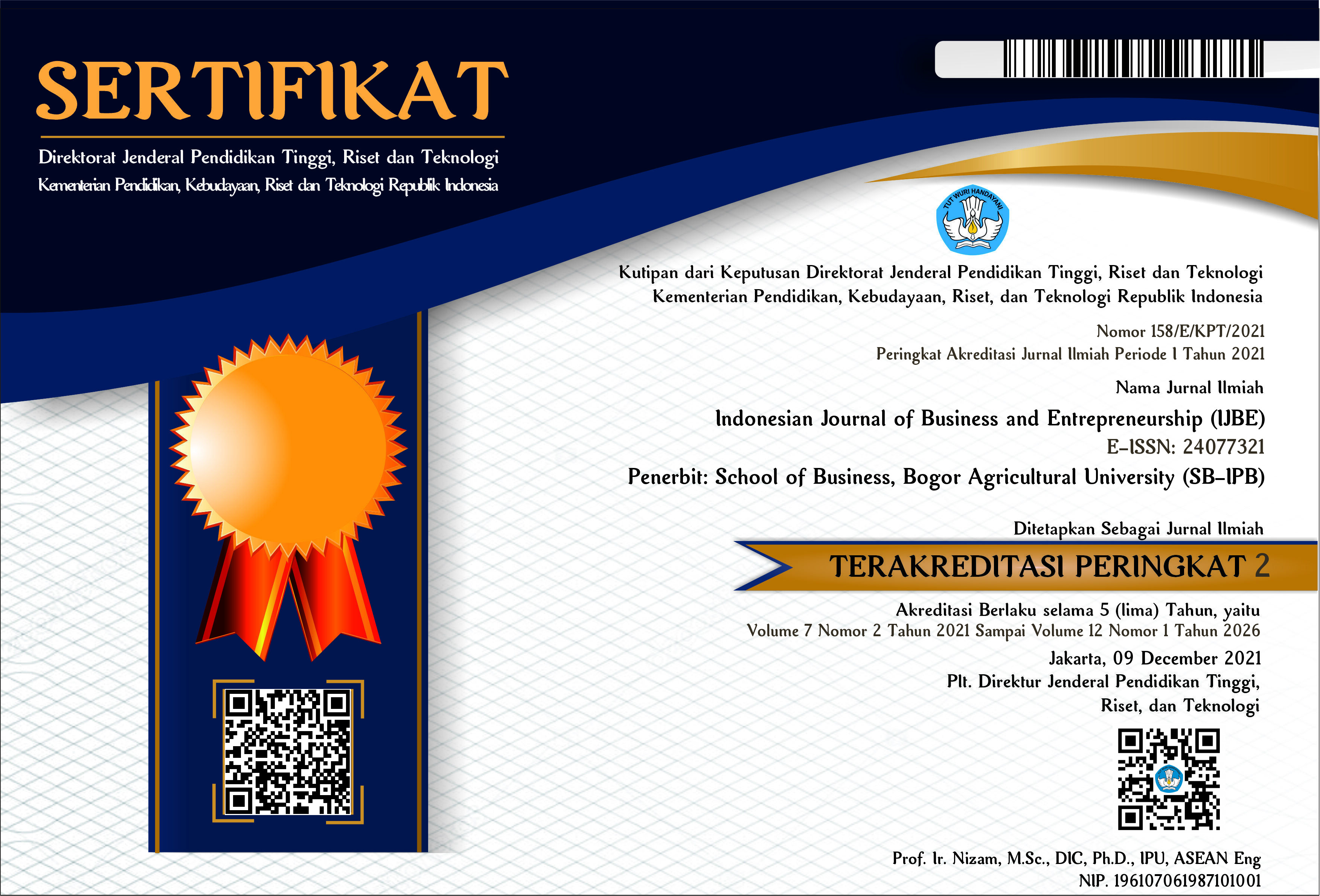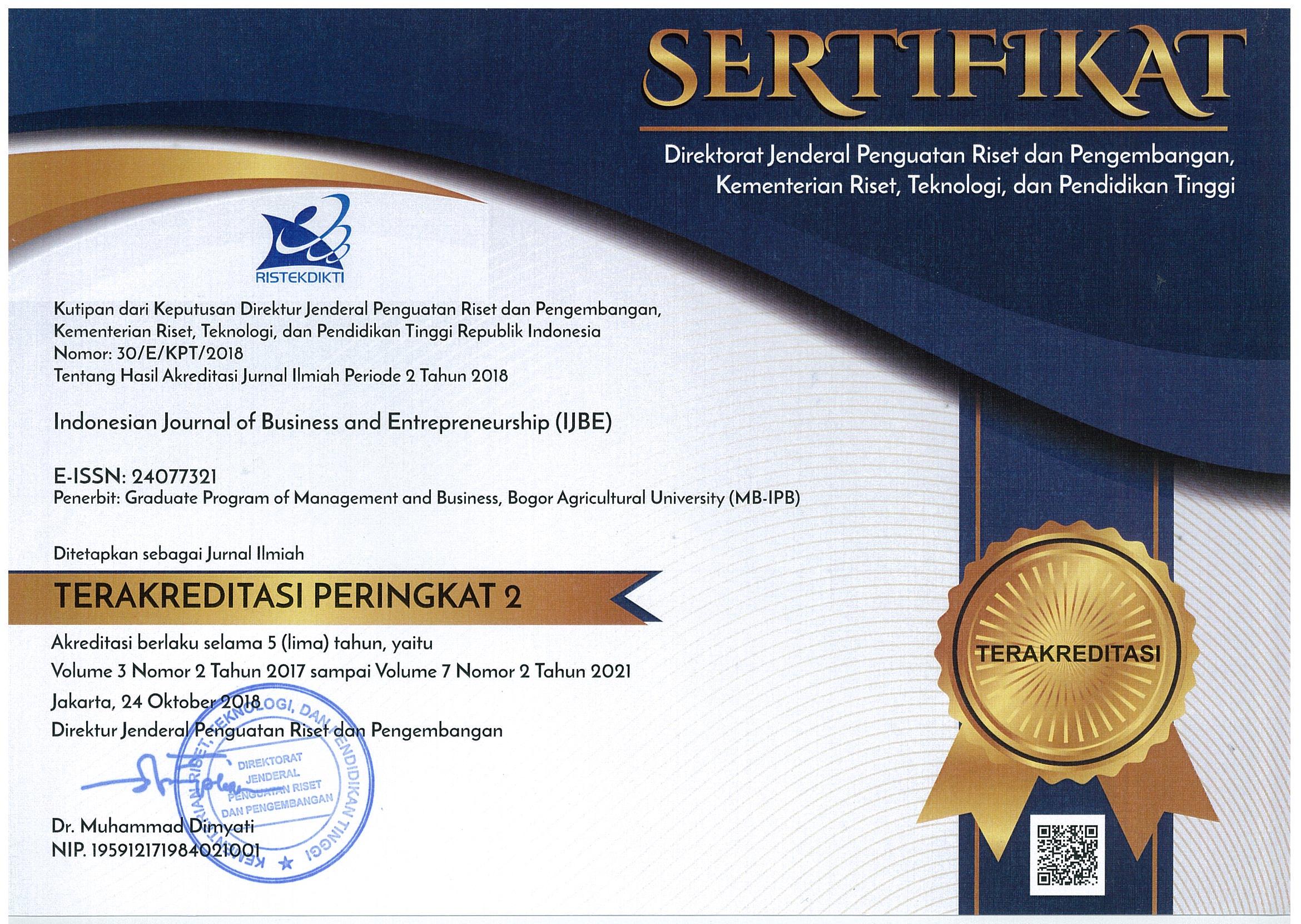Consumer’s Attitude and Willingness to Pay for Organic Rice
Abstract
Government’s support for Go Organic program provides a significant effect on the increasing organic land from only 71 thousand hectares in 2010 to 113 thousand hectares in 2014. This is caused by the shifting lifestyle of consumers who are more concerned about health. Rice as one of carbohydrate sources consumed by Indonesian people has an organic variant which is favored by many consumers. This study involved 100 households which were intentionally selected based on their convenience and readiness to be interviewed. This research was also conducted to analyze the comparison of consumer’s attitudes on organic and non-organic rice and to analyze consumer’s willingness to pay (WTP) for organic rice. Fishbein and Contingent Valuation Method were used as an analytical tool to find out the consumers’ attitudes and the maximum values that they are willing to pay. Consumers of non-organic rice had a more positive attitude on non-organic rice compared to organic rice with a WTP value of Rp 20,000 and the potential opportunity value that can be projected for organic rice in Bogor City is IDR291,788,621,400 per month.
Keywords: consumer’s attitude, contingent valuation method, fishbein, organic rice, willingness to pay
Downloads
References
Anvar M, Venter M. 2014. Attitudes and purchase behaviour of green products among generation y consumers in South Africa. Mediterranean Journal of Social Sciences 5(21):183–194. https://doi.org/10.5901/mjss.2014.v5n21p183.
Amirnejad H, Tonakbar P. 2015. The willingness to pay organic milk by consumers in Tehran. Journal of Agricultural Science and Technology. 17(2015):1685-1694.
Bienenfeld JM. 2014. Consumer willingness to pay for organic, environmental, and country of origin attributes of food products. [dissertation]. Columbus: The Ohio State University.
[BPS] Badan Pusat Statistik. 2016. Monthly Report of Social Economic Data (in Indonesian). Jakarta: BPS.
Chen MF. 2009. Attitude toward organic foods among taiwaneese as related to health consciousness, environmental attitudes, and the mediating effects of a healthy lifestyle. British Food Journal 111(2): 165–178. https://doi.org/10.1108/00070700910931986.
[FAOSTAT] Food Agriculture Organization ofthe United Nation Statistic Division. 2015. Agricultural Organic Area. http://faostat3.fao.org/search/organic%20land/E.[20 January 2015]
Fauzi A. 2006. Environmental and Natural Resources Economics: Theory and Application (in Indonesian). Jakarta: PT Gramedia Pustaka Utama.
Fraenkel J, Wallen N. 1993. How to Design and Evaluate Research In Education. Second Edition. New York: McGraw-Hill Inc.
George S. 2010. Wllingness to pay for locally grown and organically produced fruits and vegetables in Dominica [thesis]. Clemson: The Graduate School of Clemson University.
Gay LR, Diehl PL. 1992. Research Methods for Business and Management. New York: MacMillan Publishing Company.
Gil JM, Gracia A, Sanchez M. 2000. Market segmentation and willingness to pay organic product in Spain. International Food and Agribusiness Management Review 3(2):207–226. https://doi.org/10.1016/S1096-7508(01)00040-4.
Huang C, Lee C. 2013. Consumer willingness to pay for organic fresh milk in Taiwan. China Agricultural Economic Review 6(2): 198–211.https://doi.org/10.1108/CAER-04-2012-0033.
Idaman N, Yuliati LN, Retnaningsih. 2012. Consumer attitude on organic rice (in Indonesian). Jurnal Manajemen dan Agribisnis. 9(2): 117–126.
Jacob C, Jacob J. 2012. Green marketing: a study of consumer attiude towards environment friendly. Asian Social Science 8(12):117–126.
Kalashami M, Heydari M, Kazaerani H. 2012. Investigasting consumer’s WTP for organic chicken in Iran. International Journal of Agricultural Management and Development 2(4): 235–241.
Laroche M, Bergeron J, Barbaru-Forleo G. 2001. Targeting consumers who are willing to pay more for environmentally friendly products. Journal of Consumer Marketing 18(6): 503–520. https://doi.org/10.1108/EUM0000000006155.
Malhotra NK. 1993. Marketing Research an Applied Orientation. Second Edition. Upper Saddle River: Prentice Hall International Inc.
Mankiw NG. 2012. Principle of Economics. Stamford: Cengage Learning.
Mutlu N. 2007. Consumer attitude and behaviour towards organic food: cross cultural study of Turkey and Germany. [Thesis]. Stuttgart: Universitat Hohenheim.
Narine L, Ganpat W, Seepersad G. 2015. Demand for organic produce: trinidian consumers willingness to pay for organic tomatoes. Journal of Agribusiness in Developing and Emerging Economies 5(1): 76–91. https://doi.org/10.1108/JADEE-04-2013-0015.
Noviandi A. 2012. Analysis of behavior of rice consumers and implications on marketing strategy (in Indonesian) [thesis]. Bogor: IPB.
[OTA] Organic Trade Association. 2016. Organic Market Analysis. https://www.ota.com/resources/market-analysis [16 Maret 2016].
Rodriguez E, Locaze V, Lupin B. 2008. Contingent valuation of willingness to pay for organic food in Argentina. In 12th Congress of The European Association of Agricultural Economist (EAAE); 2008 Agustus 26-29; Ghent, Belgium. Ghent (BE).
Santoso I, Fitriyani R. 2016. Green packaging, green product, consumer perception, and purchasing interest (in Indonesian). Jurnal Ilmu Keluarga dan Konsumen 9(2):147–158. https://doi.org/10.24156/jikk.2016.9.2.147.
Sriwaranun Y, Gan C, Lee M, Cohen D. 2015. Consumers willingness to pay for organic products in Thailand. International Journal of Social Economics 42(5): 480–510. https://doi.org/10.1108/IJSE-09-2013-0204.
Stoleru V, Munteanu N, Jiteareanu AF. 2012. Consumer behaviour from moldova area towards organic food. Journal Lucrări Ştiinţifice Seria Agronomie 55(2): 283–287.
Tanner C, Kast SW. 2003. Promoting sustainable consumption: determinants of green purchases by Swiss consumers. Journal Psychology and Marketing 20(10): 883–902. https://doi.org/10.1002/mar.10101.
Thϴgersen J, Barcelos M, Perin M, Zhou Y. 2015. Consumers buying motives and attitudes towards organic food in two emerging markets: China and Brazil. International Marketing Review 32(3/4): 389–413. https://doi.org/10.1108/IMR-06-2013-0123.
Wang P, Pei C. 2007. Consumer behavior and willingness to pay for organic product. [thesis]. San Jose: San Jose State University.
Willer H, Lernoud J. 2016. Organic Agriculture Worldwide 2016: Current Statistics. Frick: Research Institute of Organic Agriculture (FiBL).
Xie B, Wang L, Yang H, Wang Y, Zhang M. 2015. Consumer perception and attitudes of organic food products in eastern China. British Food Journal 117(3): 1105–1121. https://doi.org/10.1108/BFJ-09-2013-0255.
Young W, Hwang K, McDonald S, Oates CJ. 2010. Sustainable consumption: green consumer behavior when purchasing products. Journal of Sustainable Development 18(1): 20–31.







